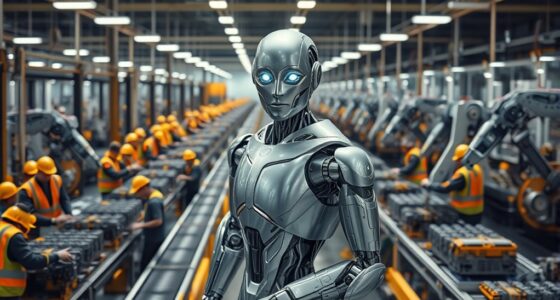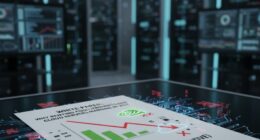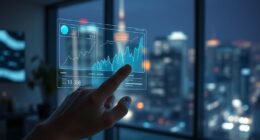AI analytics automate many routine marketing tasks like email campaigns, data analysis, and content creation, freeing you to focus on strategic and creative work. However, this shift threatens roles such as copywriting, media planning, and data analysis, potentially leading to job displacement. At the same time, new opportunities emerge in AI-driven personalization and customer experience. If you want to understand how to adapt and thrive amid these changes, keep exploring the evolving landscape of AI in marketing.
Key Takeaways
- AI analytics automates manual data analysis, reducing demand for traditional data processing roles but creating new opportunities in data interpretation.
- By streamlining campaign performance evaluation, AI analytics frees marketers to focus on strategic, creative tasks, shifting job roles.
- The adoption of AI-driven insights can displace roles in media planning and copywriting, especially at junior levels.
- Skills in AI tools and data analysis become essential, fostering new job roles in AI management, customization, and strategic integration.
- Overall, AI analytics reshapes marketing jobs by replacing routine tasks while simultaneously enabling higher-level, innovative work.

Artificial intelligence is transforming marketing jobs by automating routine tasks and enabling professionals to focus on strategic, high-value activities. When AI handles repetitive responsibilities like email campaigns, customer segmentation, and lead nurturing, you save hours each day that can be redirected toward planning innovative strategies or developing creative concepts. Programmatic ad buying has replaced many human media planners, shifting their role from hands-on execution to overseeing campaigns strategically. Real-time analytics platforms further cut down manual data analysis, allowing you to interpret insights faster and more accurately. Content generation tools now automate basic copywriting, affecting junior roles but also freeing your time to craft higher-quality, nuanced content. Overall, automation saves you over an hour daily on repetitive creative tasks, making your work more efficient.
AI automates routine marketing tasks, freeing professionals to focus on strategic and creative initiatives.
With these tasks automated, you can concentrate on high-impact areas like strategic planning and creative direction. AI-powered market research tools help you analyze industry trends and test concepts swiftly, speeding up decision-making processes. SEO tools like Clearscope and Surfer SEO enhance your ability to produce optimized content, enabling you to stay competitive in search rankings. Campaign feedback cycles become quicker with AI-generated drafts and suggestions, allowing you to refine campaigns more rapidly. Additionally, AI helps you interpret complex data sets, providing actionable insights that support smarter marketing decisions. This shift empowers you to move beyond data crunching and focus on innovation and strategic growth.
However, this evolution brings job displacement concerns. More than half of marketing professionals, nearly 60%, fear AI threatens their employment, a significant rise from previous years. Junior roles such as copywriting and media planning face reduced demand as AI tools take over their core responsibilities. Manual data teams are also at risk as AI-driven analytics streamline or eliminate some of their functions. Many believe AI will eliminate more jobs than it creates within the next few years, especially as programmatic tools challenge traditional media buying roles. This fear is compounded by the rapid adoption of automation, which, while increasing efficiency, risks leaving some behind in the job market.
Despite these concerns, emerging opportunities flourish alongside automation. AI-enhanced content marketing, personalized campaigns, and chatbots improve customer engagement and open new revenue streams. There’s a growing demand for talent skilled in AI tools and data analysis, blending creativity with technical expertise. Marketing professionals who adapt by learning these skills can capitalize on new roles and responsibilities. Meanwhile, AI-powered customer journey analytics reveal insights that *unleash* revenue opportunities, positioning you to deliver more targeted and effective campaigns. Furthermore, organizations investing in upskilling their workforce will be better positioned to navigate these changes successfully.
To thrive, you need a mix of technical proficiency and traditional marketing knowledge. Familiarity with AI tools like HubSpot or ActiveCampaign, along with strong data interpretation skills, becomes essential. Strategic thinking around aligning AI capabilities with business goals is increasingly valuable. Yet, many professionals report gaps in training and continuous education, which could hinder industry growth. As AI adoption accelerates, those who stay ahead by acquiring new skills will find themselves better positioned for future success, even as others face the threat of displacement.
Frequently Asked Questions
How Quickly Can AI Analytics Replace Traditional Marketing Roles?
AI analytics can replace traditional marketing roles quite rapidly, often within just a few years. You might see routine tasks like copywriting, data mining, and visual creation automated by 2025. As AI takes over repetitive work, your role could shift from tactical execution to strategic oversight. Staying updated and developing AI skills is essential to adapt quickly and remain valuable in the evolving marketing landscape.
What Skills Are Most Valuable for Future Marketing Professionals?
You should focus on developing skills in data-driven decision-making, like mastering analytics tools and predictive modeling, to stay ahead. Embrace AI-driven content creation and automation to enhance efficiency, but also sharpen your creativity and storytelling abilities to stand out. Staying updated on evolving AI tools and understanding privacy regulations will keep you adaptable. By blending technical expertise with creative insight, you’ll remain valuable in the future marketing landscape.
How Does AI Impact Marketing Job Salaries?
You might think AI threatens marketing salaries, but it actually boosts them. As AI skills become essential, salaries for roles like AI Marketing Strategist and Marketing Data Scientist soar—up to $156,000 and beyond. Specialized roles see a 30-50% premium, and demand is rising fast. Embracing AI expertise not only secures your job but also substantially increases your earning potential in the evolving marketing landscape.
Are There Ethical Concerns With Ai-Driven Marketing Decisions?
You should be aware that AI-driven marketing decisions raise ethical concerns like algorithmic bias, data privacy, and misinformation. Biased training data can lead to unfair outcomes, while extensive consumer data use risks privacy breaches. Lack of transparency and oversight can cause misleading content and societal polarization. To address these issues, you need to guarantee ethical standards, regular audits, and responsible data handling, fostering trust and fairness in your marketing strategies.
How Can Marketers Adapt to Ai-Driven Industry Changes?
Imagine steering a rapidly shifting river — that’s how you must adapt to AI-driven industry changes. Embrace upskilling to stay afloat, focusing on strategic and creative skills that AI can’t replicate. Collaborate with AI tools to enhance your campaigns, and stay informed on ethical and legal considerations. By becoming a hybrid expert, you’ll turn these currents into opportunities, ensuring your marketing career remains resilient and valuable in the evolving landscape.
Conclusion
If you think AI analytics is just a tool, think again—it’s a job revolution. It can create opportunities so massive, they’ll change your career forever, yet it can also wipe out entire marketing roles overnight. The future of marketing hinges on how you adapt to this AI tsunami. Fail to embrace it, and you’ll be swept aside in a flood of automation. Stay ahead, or risk becoming extinct in the marketing jungle!









